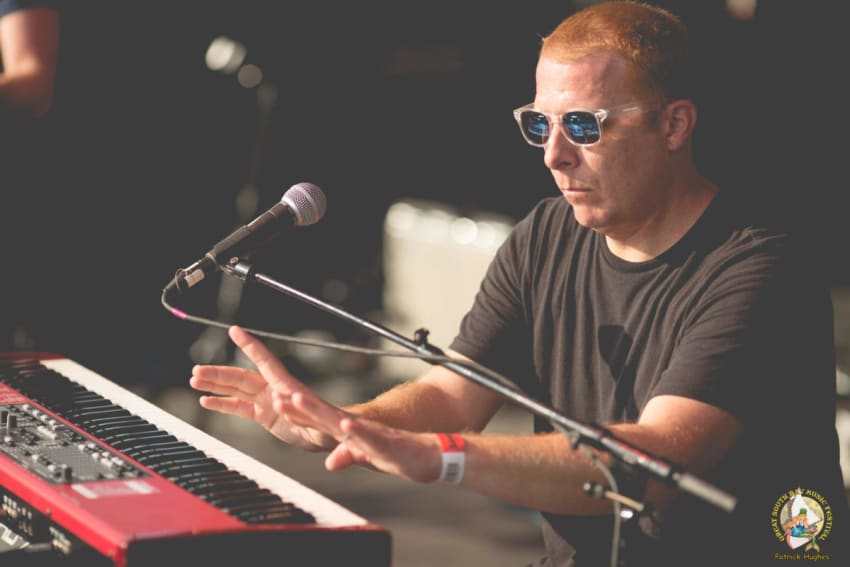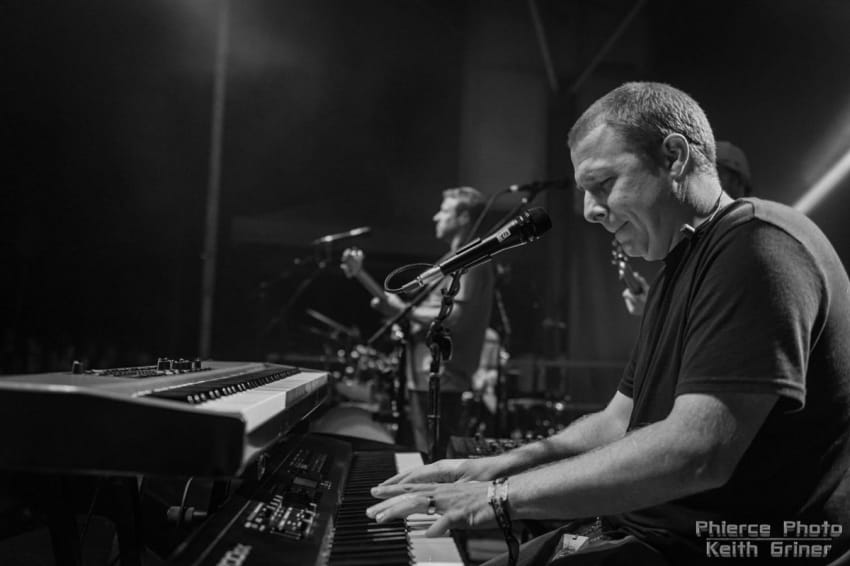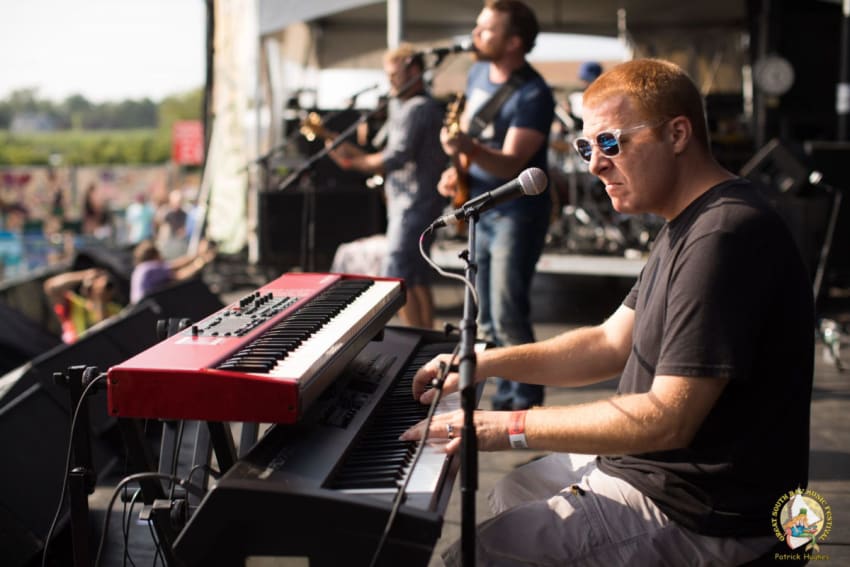An Improvisational Experience: Spafford’s Andrew ‘Red’ Johnson Discusses Touring, Jamming & More
By Chad Berndtson Sep 1, 2017 • 8:31 am PDT

Photo by Patrick Hughes
Welcome to another edition of The Art Of The Sit-In, where we mix it up with the scene’s most adventurous players and hear some stories from the road. For more, check out our recent interviews with Chris Wood, Andy Falco, Bruce Hornsby, Nels Cline, Eric Krasno, Todd Nance, John Popper and many more. (A full archive of more than 50 The Art Of The Sit-In features is here.)
One of the more entrancing releases from within the jam scene this year is Abaculus: An Improvisational Experience, by breakout Arizona funk-rock band Spafford. It’s an unbroken, hour-long cut that was completely improvised by the four-piece: bottled lightning from what was meant to be a fun, open, no expectations rehearsal, and, as a listen, something to unpack, immerse in, and, if you need, suitably introduce one of the most exciting upstart bands in the scene.
Indeed, 2017 has been the year where the buzz and good notices greeting Spafford materialized into a national following — one that has the band playing to bigger rooms, bigger crowds and more acclaim. As improvisers and sonic stylists, they jam with purpose: patient builds and forward-springing progressions that don’t wallow in ambient noise, don’t organize around shapeless vamps and do strut with purpose.
The four members — keyboardist Andrew “Red” Johnson, guitarist Brian Moss, bassist Jordan Fairless and drummer Cameron Laforest — demonstrate remarkable groupthink for a band that’s been together less than a decade (and, in Laforest’s case, less than a year), born of trust, self-awareness and patience.
Ahead of a massive fall tour that starts September 2 in Chicago and streaks around the country straight through mid-November, we asked Johnson to catch us upon Spafford’s mighty year.

Photo by Keith Griner
JAMBASE: This past year Spafford really came into its own — you’ve broken out. What shows, events, nights stand out to you from the last few months?
ANDREW “RED” JOHNSON: For me, the whole festival season has been an absolute blast, and an absolute blur. The whole festival season, playing at the Peach Fest, and getting to see some of my favorite musicians on the planet, and hob-nobbing a bit, that was a lot of fun.
The BB King’s after-Phish show in New York was a lot of fun too. But, I mean, it’s tough to pick one that stands out more than the others. It’s been kind of this whirlwind, and things are moving fast, so it’s tough to step back and enjoy the moment, as much as I’d like to. It’s been a lot of fun, we’re having a blast doing it.
JAMBASE: When did you guys start to realize you had a national following? Can you pinpoint it?
ARJ: I’d say the Breakout Tour, which was about a year ago. It was one of those moments where we sold out this show in Chicago so fast that we had to add another show the same night. That was eye-opening for us because it felt like almost out of nowhere, our name was out there. And here we are, and a lot of people have heard of Spafford now and we’re growing rapidly.
I’ve said it before, but I attribute a lot of the growth we’ve enjoyed to the fans here in Arizona. Here’s what’s interesting: the scene — the jam band scene — in Arizona is not huge, it’s not a massive scene at all. But nobody from Arizona seems like they’re really from Arizona — there are not a lot of people in the Phoenix area who seem to be from Arizona, but rather from all over the country who have moved to Arizona. So the scene is small, but the voices in that scene carry. You’ll find someone who lives in Phoenix but is from Pennsylvania, and likewise with all the other states, and they call out to their friends in Chicago, or Madison, or Philadelphia or wherever and tell them to go see this band. The voices carry really far. The fans in Phoenix are die-hard. They find something they like and they’re not afraid to talk about it.
JAMBASE: I’m guessing it’s important for you to stay on the road as often as possible right now. Do you do a lot to engage your fans, on social media and in other opportunities to interact?
ARJ: Absolutely, we try as best we can. And you know, there are a lot of local fans in Arizona who aren’t happy that we don’t have a lot of Arizona shows booked right now — we’re trying our best. We’re in this growth period, so it’s important for us to be playing all over the country.
Our fans we consider to be our friends. We have never wanted it to be, “we’re the band, and you’re the fans, and the line in the sand is right there.” There’s a certain amount of vanity in that that I’m just not into, I don’t like that idea. The most fun shows for me are the ones when it stops being this band onstage and the audience on the floor, and just becomes this experience we can all have together.
I always wanted to be a touring musician. I never expected we would grow this quickly — this all started happening very fast and it’s been amazing to meet people. There were a handful of people who came up to meet me at the Peach Festival, and it was the first time I’d ever met them but it felt like they’d known me for years. I’m just another guy that plays music. I make it very clear that I don’t consider a separation.
JAMBASE: You guys have a pretty deep rapport on stage — the improvisational segments have purpose, move forward, aren’t just sort of clustered around vamps or somebody hot-dogging. How did you build that over time? Is that just hours and hours of woodshedding together in Spafford’s case?
ARJ: Interestingly, no. It’s been a lot of personal practice on on own instruments as well as practicing together. There was a long period in Spafford history where we didn’t all live in the same city. I was in Phoenix, but two of us were in Prescott, Arizona, and one more of us was in Flagstaff. That’s a three hour difference all the way around so it took a long time to get an actual practice schedule together. And you have three guys that are pretty young and then there’s me, and everyone’s got lives going on. There are bands that are shredding together every single day in the studio and recording all the time, and for us, it was not like that. So we had no choice but to put in a lot of personal time on our own instruments and then be able to trust that everyone was holding up their part of the deal.
It doesn’t happen every single time where we’re completely in line onstage, but we do trust. I know that I can get on stage with Brian, Jordan and Cameron and have complete confidence that we’re still going to do OK no matter if I personally have a bad show, because they’re so talented and so well prepared. And I think all three of them feel that way about me — I will help carry them if for some reason one stumbles. And improv chops is something we just always wanted to get to. We want to create in the moment — we’re four people who want to do that, really want it bad. Which is not to say that people who don’t do improvisation are “lesser than,” it’s just kind of what we wanted to do, always. It’s hard to explain.

Photo by Patrick Hughes
JAMBASE: Did you grow up following the major jam scene bands from the Phish, Widespread, moe., H.O.R.D.E. kind of era?
ARJ: All of whom you named I would consider to be the fathers of the scene. But for me it goes back further. I grew up listening to the [Grateful] Dead, actually — my father was really into the Dead. And The Allman Brothers, those guys were my heroes. This past year has been super rough for Allman Brothers Band fans. It’s been super depressing, but it was an amazing moment for me at the Peach Fest to be able to reach over and shake hands with guys like Jaimoe and Jack Pearson and Oteil [Burbridge]. Guys like that, to me, are the founders — the cornerstones. You talk about the founders of what we’d consider jam band music, you’re looking at the Dead, and the Allmans, and Little Feat — bands like that. Billy Payne was one of the first musicians I ever heard play and I was like holy shit, I’d love to be able to do that. In a time where everyone’s listening to, I don’t know, Vanilla Ice and Marky Mark, I’m at home studying The Allman Brothers and listening to “Dixie Chicken” so many times it’s pissing off my parents.
Phish, to me, is kind of the high water mark, especially for bands coming up in the 90s. They just took off. I remember I spent a couple months really consuming Junta, maybe around when I was 12 years old, and thinking, “What the fuck is that? That’s just amazing,” followed by the rest of their albums. Getting to see Phish in the mid and late-90s was, again, one of the high water marks. And obviously I’m a huge fan of Umphrey’s [McGee], with whom we got to go out on the road this year.
JAMBASE: What do you take away from your time out with Umphrey’s?
ARJ: We learned so much from those guys, not only the band, but also their crew. I don’t know all that many touring band crews, but I just can’t imagine there’s anybody out there that does it a whole lot better than they do.
We got to hear a lot of stories from them about life on the road and life coming up in this scene. The main thing I took away from that is that we need to take the music seriously. Everything else is kind of fun and games. We’ve got management now to help us handle the booking and the logistics and all that, so our focus has to be on making the music as good as it can possibly be at that moment. After that, it’s fun. We’ve all heard the statement that if you do something you love you never work a day in your life, but here’s the thing: it’s still a job and it’s still difficult — even the greatest job on the planet is. You keep in mind that you get to bring this to a bunch of people. Our fans work their asses off and then choose to spend their money to come see us on a Saturday night. There’s a pressure involved in that: I better be top notch when they show up. So that’s what we got from Umphrey’s — to take the music as seriously as we possibly can. Not a lot of people get this opportunity to do this job.
JAMBASE: Talk about Abaculus This is a remarkable listen, with so much to grab onto. Did you go into it intending to improvise and record, or at least do some kind of free-flowing capture?
ARJ: If I’m being 100 percent honest, I can’t count how many times I’ve listened to it, because it’s so much fun. I didn’t even know we were recording, and I don’t think that Brian or Cam even knew we were working. Jordan kind of snuck back there and hit record, but none of us had any intention of creating a product like this in any way. And I hate to even call it that, “product,” but we had no intentions here.
We were working really hard on both new music and old music, trying to perfect a handful of sets and ideas for festival season. So we jumped in: why don’t we just jam today? We’ll make something up! So Brian said, who wants to start? And we played the game “Noes Goes,” and Brian looks around and he’s it. So he started it off, and it’s funny, on the original full recording, which includes the very beginning, you can actually hear us all saying, who’s going to start it off? And we do Noes Goes and you hear Brian say, “Shit!” [laughs]
But he just started playing and then things happened. Sometimes people don’t really believe or think we’re creating this on the spot, but I assure you what you hear is all improv. There was an interview recently where Jordan talked about that we have no visual signals or verbal signals, and that’s true, because those are against the rules. If Brian starts with an idea, sometimes you’ll hear us on there searching a bit to hear what we want, and once we find it, we stay there for a while, and then someone will play something different and we all hear it and we start moving in a different direction, but together.
That includes changing time signatures – I can’t describe how much fun that is. There are no rules. You know, professional runners talk about runner’s high. They run marathons, and they always seem to talk about how they get to the 10-mile mark and if they can push through that, they feel like they could just run forever. I think I can relate to that in this — except in a team setting. If someone doesn’t have an idea … say I’ve run out of ideas, I can hang back and let someone else carry it. We’ve all heard the analogy of playing improvisational music as a conversation, and we keep some going, or start new ones. Abaculus turned out great. I’m sure there will be people who aren’t fans of it, but I don’t know, fuck ‘em [laughs]. I love it! I can’t wait to do more of that.
JAMBASE: So no one is traffic cop? You really have no one fully guiding what’s happening improvisationally on stage?
ARJ: Right. There’s no fun in that. If it’s planned, it’s not improvised. There are times on stage, sure, where we might be in a jam or improvising and just kind of creating on the spot, and maybe Jordan will switch and go in a different direction, and if I can’t hear it I’ll get his attention somehow to let him know I can’t make him out in my monitor or I’ve missed some sort of instrumental hint, but we move forward pretty quickly. We’ve done a lot of thes kind of extended jams, though, the “Cabin Jam” for example was something we did a year or so ago that was another of these kind of figure-it-out things. That’s who we are.
JAMBASE: Tell me a sit-in story.
ARJ: I sat in with Umphrey’s in San Diego. About five minutes before Spafford’s set, Joel [Cummins] came up and tapped me on the shoulder and said, “Hey, we’re going to have you come and sit-in with us tonight.” I about lost my shit. I was freaking out. You know, they’re Umphrey’s McGee, they’re one of the tightest bands in the industry right now. You can’t sneak a Kleenex in between those guys, they’re so tight, and they keep their sit-ins fairly rare.
I was super nervous, and I played a terrible show with Spafford that night. [laughs] Then, I’m onstage waiting to go on with Umphrey’s, and I don’t know what song it’s going to be, other than it’s in A. I’m thinking “don’t fuck this up,” and then I also see this giant rat’s nest of cables right in front of where I was about to walk on stage. I was thinking to myself, fuck, if I trip over these cables and fall on my face, I guarantee I will just turn around and walk off stage, go directly to the airport, fly home and be done with music. But I went out there — I convinced myself I could make it over the nest of cables — and did what I do, and I think it turned out a bit. I kind of blacked out a bit but the Umphrey’s guys enjoyed it and I think it was fun.
We’ve had Joel sit-in with us a few times. He’s really a phenomenal keyboard player and I’ve always been a big fan of his, so it’s always a blast when he comes to join us. So Joel, if you’re reading this, thanks and come back and hang with us again!
Loading tour dates
